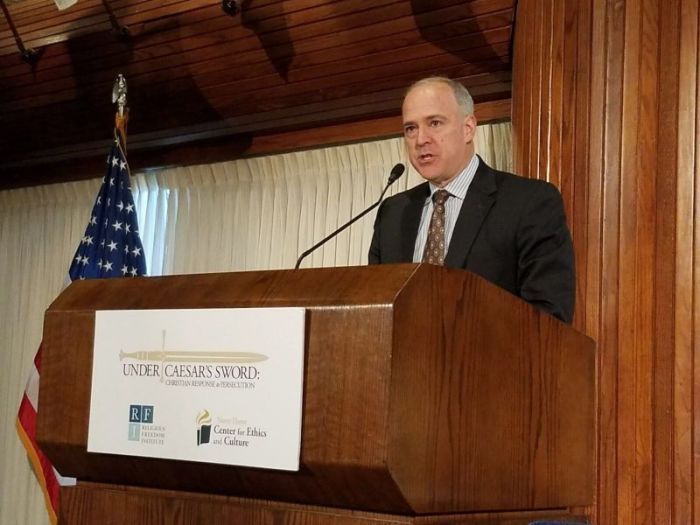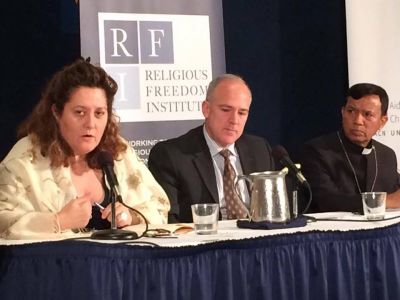Groundbreaking Research Reveals Most Effective Ways to Combat Christian Persecution: Report

WASHINGTON — A new study released this week reveals the extent of Christian persecution worldwide and the effective strategies the oppressed are employing to combat it.
Gathered before hundreds at a symposium to discuss the report titled, "In Response to Persecution," at the National Press Club on Thursday, several scholars who took part in the research presented the key findings in this first systematic global investigation of the responses of Christian communities to persecution. The report is part of the Under Caesar's Sword project at the University of Notre Dame.
Donald Cardinal Wuerl, the Catholic Archbishop of Washington, D.C., opened the conference urging those in attendance to do four things. Christians must continue to be aware of the plight of their persecuted brethren, raise their voices in support of them, send them material aid and assistance, and continue to pray, he said.
With particular regard to Christians in the Middle East, who like other Christians around the world marked the Easter holiday on Sunday with great hope, there is an irony here that should not be lost on us, noted Elizabeth H. Prodromou, a professor of conflict resolution at Tufts University in remarks preceding a panel discussion of the report.
"It is precisely in the lands where Christianity originated that Christians and their sites are actually in danger of extinction," she said.
"The four ancient patriarchates, in Antioch, Alexandria, Constantinople, and Jerusalem are examples of the deliberate, lethal, persecution and discrimination and repression that Christians in those parts of the world face."
The study found that 43 percent of persecuted Christians respond to persecution primarily with what are called "strategies of survival," which includes adapting ones life and practices to blend into the community, going underground, or fleeing the land altogether.
Thirty-eight percent of persecuted Christians focus on building relationships with other Christian communities, non-Christian religions, and secular figures, called "strategies of association."
Only 19 percent of persecuted Christians embrace "strategies of confrontation," where they directly challenge a repressive government or non-state entity like a terror group, actively mobilizing against the injustices perpetrated against them. The overwhelming majority of such confrontations are nonviolent.
"While strategies of survival and association may not seem dramatic, we should not overlook the creativity, courage and theological conviction that often characterize them," said Daniel Philpott, a professor of political science at Notre Dame who is one of the directors of the Under Caesar's Sword project.

"Christian communities take up these short-term strategies with the long-term religious conviction that if they can hold out, a better day will arrive — not only in the life to come, but also perhaps in earthly time," Philpott said.
The Christian Post asked Prodromou if their research shows that French philosopher Regis Debray was correct when he observed that in America, Middle Eastern Christians are "too Christian for the Left and too foreign for the Right" to inspire any meaningful advocacy for their plight.
"Most of the Christians in the Middle East happen to be Eastern Christians which for many Christians in the United States are very foreign and alien," Prodromou said.
"They think of Christianity as Western Christianity. So many Christians in the U.S. really think about the region as a place where Christianity was but no longer is. And so, I think that not knowing the history and also the demographics, the Christian demography of the region has worked to the detriment of a robust response on the part of American Christians."
As far as the political Left goes, she continued, they have "allowed the issue of religious freedom in general ... to be owned by the Right."
"But support for freedom of conscience, belief in religion, as far as I'm concerned, is a nonpartisan issue, and it must be an nonpartisan issue," she maintained.
The Under Caesar's Sword project has also shown some encouraging signs.
"The trauma of Christians in the Middle East has spawned a new kind of solidarity and ecumenism. So all Christians of every denomination are realizing that they must work together, they must know one another," Prodromou said.
The repair of the fractured Church is one of the positive things that is coming out of this tragedy, she added.
CP asked Prodromou what the increased emphasis on religious freedom set forth in the Frank Wolf International Religious Freedom Act of 2016 will yield for persecuted Christians.
"I think it's important because it continues to give traction to the issue, and the need for persistence and constant shining the light is what's necessary," she replied.
"And, as Christians go, so go other religious minorities."
The Under Caesar's Sword project is a three-year research endeavor and a collaboration of 17 scholars and academic centers including the Notre Dame Center for Ethics and Culture, the Religious Freedom Institute, and Georgetown University's Religious Freedom Research Project.




























